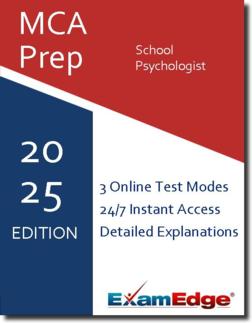MCA School Psychologist (057) Practice Tests & Test Prep by Exam Edge - Topics
Based on 29 Reviews
- Real Exam Simulation: Timed questions and matching content build comfort for your MCA School Psychologist test day.
- Instant, 24/7 Access: Web-based MCA School Psychologist practice exams with no software needed.
- Clear Explanations: Step-by-step answers and explanations for your MCA exam to strengthen understanding.
- Boosted Confidence: Reduces anxiety and improves test-taking skills to ace your MCA School Psychologist (057).

Understanding the exact breakdown of the MCA School Psychologist test will help you know what to expect and how to most effectively prepare. The MCA School Psychologist has multiple-choice questions The exam will be broken down into the sections below:
| MCA School Psychologist Exam Blueprint | ||
|---|---|---|
| Domain Name | % | Number of Questions |
| Understanding Human Development, Diversity, and Learning | 25% | 25 |
| Assessing and Addressing Individual and Schoolwide Needs | 50% | 50 |
| Working in the Professional Environment | 25% | 25 |


